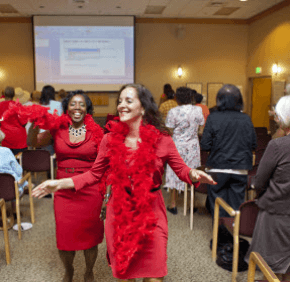By Maria Wiering
mwiering@CatholicReview.org
Twitter: @ReviewWiering
Wearing feather boas, crimson dresses and high heels, leaders kicked off the year’s inaugural Red Hot Mamas meeting with music, encouraging the 70 participants to get to their feet and dance. They obliged, clapping and swaying with the music. Mostly middle-aged women, they were at Baltimore’s MedStar Good Samaritan Hospital Sept. 10 for a presentation on menopause, but were open to a bit of levity.
The idea that a woman can experience hot flashes – and other menopausal symptoms – without losing her femininity is part of Red Hot Mama’s allure for women going through midlife hormonal changes, marking the end of a female’s fertility. For many women, talking about menopause carries a stigma, one that Red Hot Mamas is trying to break.
“We all go through this transition – it’s a trademark of what it means to be a woman,” said Karen Giblin, Red Hot Mamas’ founder and a guest at MedStar Good Samaritan’s September meeting, which coincided with National Menopause Awareness Month.
A Baltimore native and former St. Leo in Little Italy parishioner who now lives in New Jersey, Giblin began the menopause education organization in 1991 after undergoing a hysterectomy at age 40. She didn’t feel prepared for menopause, she said, and made it her mission to increase available information.
Red Hot Mamas is now the largest menopause education organization in North America, with free monthly programs at more than 200 hospitals and physician group practices in the United States and Canada.
MedStar Good Samaritan launched its program six years ago. It recently moved under the purview of Dr. Michelle Germain, the hospital’s new chief of gynecology and director of Women’s Health Services, and a menopause specialist. The group encourages women to take charge of their health, she said.
American culture is growing more open to talking about menopause, Germain said, attributing the influence of Oprah and Suzanne Somers; advice-packed, often humorous books; and the off-Broadway production of “Menopause, the Musical.” More medical information is also available due to the Women’s Health Initiative, a government-sponsored postmenopausal women’s health study launched in 1991.
However, for many women, it’s still an uncomfortable topic to discuss with their closest friends or their primary care providers. That’s why Germain is grateful for the Red Hot Mamas, which features speakers on a variety of women’s health topics.
“If you provide an atmosphere where it’s socially acceptable to discuss your hot flashes, leaky bladder or your irritable bowel, they (women) are more likely to share their symptoms and learn from each other,” said Germain, a urogynecologist, member of the North American Menopause Society and certified menopause practitioner.
As the average lifespan increases, postmenopausal health is increasingly important. Menopause-aged women need to pay more attention to their health, as risks increase for other problems, such as osteoporosis and higher levels of bad cholesterol, Germain said.
Women typically experience menopause – defined as one year without a menstrual cycle – between the ages of 45 and 55, but common symptoms such as night sweats, libido loss and mood changes often begin in the pre-menopausal years called perimenopause, as a woman’s ovaries reduce the production of estrogen, a hormone central to women’s fertility. A variety of hormone replacement therapies are available, but some women reject medical intervention, depending on how much the hormonal changes impact their lives, Germain said.
The healthier a woman is when she enters perimenopause, the easier her transition is likely to be, Germain said. She recommends that women quit smoking, decrease their caffeine and alcohol intake and increase exercise. Weight-bearing exercises, Pilates, and, in particular, yoga, are beneficial for aging women, she said.
“What I like about what I do is the fact that by talking to women, educating women and treating them, I can improve the quality of their lives,” Germain said.
Dr. Michelle Germain will be providing an overview of the physical and emotional changes that accompany menopause and treatment options at MedStar Good Samaritan’s next Red Hot Mamas meeting, Oct. 1 at 6 p.m. For more information or to register, visit MedStarGoodSam.org/RHM or call 443-444-4100.
Also see:


